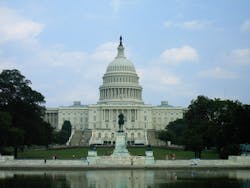Environmental groups have called on President Barack Obama to order a review of the climate change implications of the federal oil and gas program and bring a halt to new oil and gas leases on U.S. public lands.
The call comes as the Obama Administration has leased millions of acres of U.S. public lands to oil and gas companies, opening the door for extensive drilling and fracking of some of the nation’s most treasured landscapes. Thirty-four million acres of public lands are now under the control of the oil and gas industry.
“If you think the right-wing militants in Harney County, Ore., are bad, wait until you hear how oil and gas companies have taken over millions of acres of our public lands,” said Tim Ream, climate and energy campaign director of WildEarth Guardians. “It’s unbelievable that our government keeps leasing public land to dirty energy companies while turning a blind eye to the climate implications—it’s time to get the government out of the oil and gas business and return public lands to the people.”
This development is responsible for massive amounts of carbon pollution from methane leaks and oil and gas burning. Estimates indicate that drilling and fracking on public lands account for almost a quarter of domestic energy-related carbon emissions and 4% of U.S. global warming pollution, although a comprehensive review of the climate impacts of public lands oil and gas has yet to be undertaken.
“The federal oil and gas program is inconsistent with our climate goals and needs a reality check,” said Marissa Knodel, climate change campaigner at Friends of the Earth. “By taking into account the significant impacts of drilling and fracking on our natural heritage, the reality is that the costs to our lands, waters and climate are way too high. Until those costs are known, publicly owned oil and gas must remain in the ground.”
In the letter, the groups echoed the president’s own call to keep fossil fuels in the ground and his State of the Union remarks—that America needs to change the way its oil and coal are managed to “better reflect the costs they impose on taxpayers and the planet.”
“From New York to Paris, the people have spoken and demand action to halt state-sanctioned initiatives that foul our waterways and endanger our planet,” said Marc Yaggi, national director of Waterkeeper Alliance. “A comprehensive environmental review of the federal oil and gas program is long overdue.”
The U.S. Department of the Interior manages the federal onshore oil and gas program. Guidance posted on the White House’s website since 2014 has directed Interior to complete a comprehensive environmental review of climate emissions from the federal oil and gas program; thus far, the department has not heeded that call. Groups today called for a moratorium on new oil and gas leasing until a climate review is complete.
Today’s letter comes amid a Keep It in the Ground movement calling for an end to all new leasing of fossil fuels on U.S. public lands and waters. That movement has protested recent Interior oil and gas lease sales, causing two to be postponed.
The letter is signed by Earthjustice, Friends of the Earth, Greenpeace, Rainforest Action Network, Waterkeeper Alliance and WildEarth Guardians.
Source: Friends of the Earth


